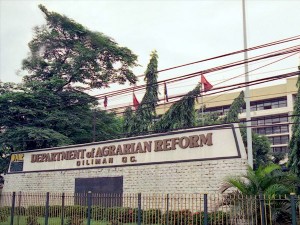MANILA, Philippines—The Department of Agrarian Reform officials have defended the agency from allegations that it was among government offices receiving endorsements from legislators for corruption-tainted projects, saying “all of these requests go through project evaluation processes in due course.”
In a statement issued by Undersecretary for Legal Affairs Anthony Parungao, the DAR said it has been regularly receiving its share of endorsements and requests for projects, not only from legislators, but also from local government units, from provincial councils to barangays (villages)
“It even receives project requests from civil society organizations, churches and private individuals,” it said.
The DAR said it usually determined whether the projects requested or endorsed actually fell within the mandate of the department.
“Even when they do, the Department still determines whether the projects actually benefit the intended beneficiaries or if it falls within the scope of existing DAR projects before it can accede to such requests,” it said.
The DAR also noted that in a number of cases, it declined to use funds endorsed for projects referred by legislators as the budgets for the Comprehensive Agrarian Reform Program (CARP) proved sufficient to undertake them.
“In some cases, these funds were simply withdrawn as the Department insisted that implementation of these projects go through the usual processes prescribed by COA [Commission on Audit] rules,” it said.
As early as 2012, the DAR said it had started its own internal review of alleged misuse of funds for such projects.
“Documents and other evidence it has collected has already been submitted to the COA, the Ombudsman, the DOJ [Department of Justice], and the NBI [National Bureau of Investigation]. It continues to cooperate with the ongoing investigations of these agencies,” it said.
The DAR earlier said it was already collaborating with the Office of the Solicitor General in pressing collection cases against questionable nongovernmental organizations (NGOs) that were able to access pork barrel funds in late 2010 to 2011.
It said the agency had collated the documents needed for the filing of complaints against five of the NGOs that were purportedly endorsed by legislators to receive the funds.
